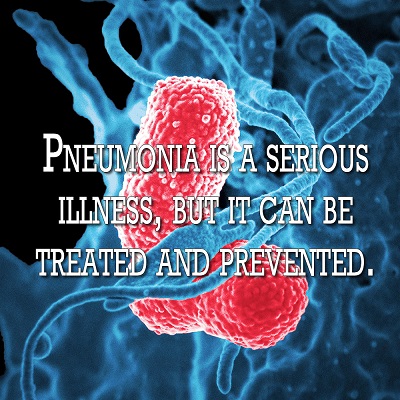 Billions of people suffer from pneumonia each year. This type of lung infection remains one of the top reasons for both adults and children alike to be hospitalized. In 2017 alone, pneumonia accounted for 15% of deaths among children five years and under worldwide.
Billions of people suffer from pneumonia each year. This type of lung infection remains one of the top reasons for both adults and children alike to be hospitalized. In 2017 alone, pneumonia accounted for 15% of deaths among children five years and under worldwide.
About a million adults in the US become hospitalized each year because of pneumonia. With COVID-19 being experienced on a global scale, the statistics for pneumonia-related hospitalizations and deaths are expected to rise.
But what exactly happens when you have pneumonia? Let’s take a look at what causes this lung infection, as well as its symptoms and treatment.
What is Pneumonia?
Pneumonia is the infection of one or both lungs, which causes air sacs, called alveoli, to be filled with pus and become inflamed. When this happens, patients experience difficulty breathing as the oxygen supply to the bloodstream is affected.
What Causes Pneumonia
Pneumonia can either be caused by a viral, bacterial, or fungal infection. The germs that cause pneumonia are highly contagious and can be spread through airborne droplets from sneezing and coughing.
Bacterial pneumonia can be caused by various bacterial strains, the most common being Streptococcus pneumoniae. Influenza is the most common respiratory virus that can cause pneumonia. The respiratory syncytial virus (RSV) and rhinovirus or the common cold can also cause pneumonia. Fungi from bird droppings or soil can also cause pneumonia which can be severe for people with weak immune systems.
Symptoms of Pneumonia
Symptoms of pneumonia can range from mild to severe, depending on different factors such as the type of infection, age, and overall wellbeing. Mild cases will clear up in a matter of days, without the need to see a doctor. However, infants, older people, and people with weakened immune systems can suffer from severe symptoms.
Symptoms include:
- Cough that may or may not produce phlegm
- Fever
- Chills
- Headache
- Loss of appetite
- Fatigue and body malaise
More severe symptoms can include confusion or changes in mental awareness. These are common among older people. Infants who have pneumonia may not have these common symptoms, or they may not be as easily discerned. The most common indications of pneumonia among infants are fever and cough and being restless. With older children, wheezing can also be a sign of pneumonia, in addition to the other symptoms.
Types of Pneumonia
The types of pneumonia are dependent on how the patient acquired the infection. Pneumonia can be acquired during the course of a patient’s hospitalization, called hospital-acquired pneumonia. If the patient acquired the infection outside a hospital setting, then it is considered to be community-acquired pneumonia. Other types of pneumonia are ventilator-acquired and aspiration pneumonia.
Treatment and Management of Pneumonia
Treating and managing pneumonia depends on the cause of the infection. If the cause is a bacterial strain, patients are given oral antibiotics to be taken over the course of several days. Patients are instructed to finish the course of medication regardless of whether they start feeling better, in order to clear out the bacteria completely.
Viral pneumonia can be treated with antiviral drugs if needed, which can last up to several weeks. However, most symptoms of viral pneumonia can clear in a matter of days and can often be managed at home. Taking over-the-counter medications such as aspirin, ibuprofen, or acetaminophen for pain relief may be taken. Fungal pneumonia can be addressed by antifungal drugs which are taken over several weeks.
If the patient is hospitalized due to pneumonia, intravenous antibiotics will usually be administered.
Preventing Pneumonia
Getting vaccinated still remains the best defense against viruses and bacteria that can cause pneumonia. There are several types of vaccines that correspond to different types and strains of infection. Not all vaccines can cover all types of viruses and bacterial strains.
Symptoms are likely to be more severe and pneumonia can be more frequent without vaccination. Other preventive measures include regular handwashing and keeping a healthy lifestyle to strengthen the immune system.
Pneumonia is a common illness, and yet it remains a threat to health and life. While most people can recover from pneumonia, there are also those who are more at risk and pneumonia may lead to more complications. Pneumonia is a serious illness but can still be prevented.






